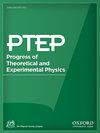CP 角测量理论
IF 8.3
4区 物理与天体物理
Q1 Physics and Astronomy
引用次数: 0
摘要
80 年代初,桑达先生及其合作者撰写了关于直接、简洁测定单位角 φ1 (β) 的重要论文。这激励了我们中的许多人,进而想出了类似的方法来直接和简洁地测定另外两个单位角,即φ2(α)和φ3(γ)。将介绍这些直接测定的现状,以及我们对 Belle-II 达到 50 ab-1 光度和 LHCb 升级后的预期。特别强调的是,为了直接测定φ3,Belle-II应该能够处理D0或$\bar{D}^0$ Dalitz衰变的终态,其中包含一个π0(这对LHCb来说是困难的),然后它们可能会在提高φ3测定的准确性方面取得进一步的进展。下面简要回顾一下早期用于约束单位性三角形(UT)的晶格输入。强调了它在支持小林-掩川(Kobayashi-Maskawa)CP 违反理论中的关键作用。多年来,晶格方法取得了重大进展,我们将讨论这些方法对UT的最新约束以及与当前直接测定的兼容性,并对未来前景提出一些看法。本文章由计算机程序翻译,如有差异,请以英文原文为准。
Theory of CP angles measurements
In the early 80’s Sanda-san and collaborators wrote key papers on the direct and clean determination of the unitarity angle φ1 (β). This motivated many of us for analogously coming up with ways for direct and clean determinations of the other two unitarity angles, φ2(α) and φ3(γ). Current status of these direct determinations as well as our expectations for when Belle-II has 50 ab−1 of luminosity and LHCb with some upgrades, will be given. In particular, it is emphasized that for direct determination of φ3, Belle-II should be able to handle final states in D0 or $\bar{D}^0$ Dalitz decays, that contain one π0 (which are difficult for LHCb) then they may make further inroads in improving the accuracy of φ3 determination. Early lattice inputs for constraining the unitarity triangle (UT) are briefly recalled. Its crucial role in supporting the Kobayashi-Maskawa theory of CP violation is emphasized. Over the years lattice methods have made significant progress and latest constraints from these for the UT will be discussed as well as compatibility with current direct determinations and some comments on future outlook will be made.
求助全文
通过发布文献求助,成功后即可免费获取论文全文。
去求助
来源期刊

Progress of Theoretical and Experimental Physics
PHYSICS, MULTIDISCIPLINARY-PHYSICS, PARTICLES & FIELDS
CiteScore
12.00
自引率
5.70%
发文量
148
审稿时长
17 weeks
期刊介绍:
Progress of Theoretical and Experimental Physics (PTEP) is an international journal that publishes articles on theoretical and experimental physics. PTEP is a fully open access, online-only journal published by the Physical Society of Japan.
PTEP is the successor to Progress of Theoretical Physics (PTP), which terminated in December 2012 and merged into PTEP in January 2013.
PTP was founded in 1946 by Hideki Yukawa, the first Japanese Nobel Laureate. PTEP, the successor journal to PTP, has a broader scope than that of PTP covering both theoretical and experimental physics.
PTEP mainly covers areas including particles and fields, nuclear physics, astrophysics and cosmology, beam physics and instrumentation, and general and mathematical physics.
 求助内容:
求助内容: 应助结果提醒方式:
应助结果提醒方式:


